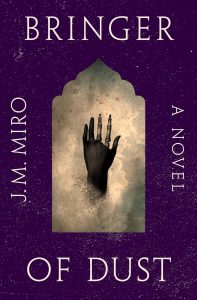Bringer of Dust by J.M. Miro: Review by Alex Brown
 Bringer of Dust, J.M. Miro (Flatiron Books 978-1-25083-383-9, $29.99. 608pp, hc) September 2024. Cover by Keith Hayes.
Bringer of Dust, J.M. Miro (Flatiron Books 978-1-25083-383-9, $29.99. 608pp, hc) September 2024. Cover by Keith Hayes.
Bringer of Dust, the second doorstopper of a novel in J.M. Miro’s The Talents Trilogy, picks up not long after the events of the first book, Ordinary Monsters. Several adults, beloved and despised, and children, innocent and manipulated, lost their lives in the course of the first book, sometimes due to the cruelties of others, and sometimes due to the consequences of their own actions. Turns out some of those who were supposed to be dead are still out there, lurking in the woods around the Italian villa where the survivors are hiding, haunting the sewers beneath London’s rowdy streets, biding their time in the catacombs of Paris, and plotting their next moves in the orsine (the land of the dead that can only be accessed by a special kind of Talent, or magically inclined human, called a glyphic). I should stop you right here if you haven’t read the first book. This is not the kind of series where you can pop in midstream. There’s way too much backstory and buildup you need in order for the story to not only make sense but to feel the weight of emotions Miro is piling up.
Although this series is set during the late Victorian era, there is nothing romantic or grand about this world. Ordinary Monsters is a dark, terrible tale about the lengths the powerful will go to force the world to bend to their wishes and what happens when someone finally fights back. Bringer of Dust is just as dark, yet also grimmer and more melancholy. While the first story had a glimmer of hope that maybe, just maybe things could get better, the second is things getting much, much worse. Most of our core team from the first book – Alice Quicke, Charlie Ovid, Ribs, Komako, Oskar (and his flesh monster companion Lymenion), Mrs. Ficke, Miss Davenshaw, and Marlowe – have separated, each working on their own projects and plans, sometimes in pairs or trios but often alone. They each have a job to do, and the trauma of that work is wearing them down.
All Charlie wants is to figure out how to get back to the orsine to rescue Marlowe. Standing in his way are several new enemies. One wants the special dust that bound the previous Big Bad to his boss, a malevolent being called a drughr. Another wants to stop Charlie from opening the orsine and potentially letting out something even worse than the drughr. Others want to rekindle a dormant war on Talentkind. All that stands in their way are a few teenagers and their weary, weakened guardians.
Structurally, the sequel worked for me in ways the first book didn’t. I found Ordinary Monsters a little too predictable and, well, ordinary. Entertaining, sure, but nothing I hadn’t seen done with more diverse casts in other fantasy stories, both adult and young adult. Bringer of Dust is a marked step up. I had planned to read this 600-page chonker over the course of a couple weeks during my summer vacation. Instead, I inhaled it over three days. I could not put it down. Even when the plot dragged or Miro stalled for time, the story was fully engaging. Although the plot itself was still fairly predictable, the journey got more interesting and the characters more nuanced.
I fretted over Marlowe like a mother hen, watching him descend into the depths of hell knowing it was both the worst choice he could make and the only viable option. I raged over the abuses Charlie suffered and cheered each time he managed to fight back and draw blood. I wanted to hug Oskar and Ribs and send Komako to a therapist. My heart broke for Alice when she learned the truth about her past and I held my breath as Miss Davenshaw and the rest of the children from Cairndale and the Fiske house faced their fates.
Overall, Bringer of Dust is a stronger novel, craftwise. As complex as his Talents world is, Miro balances everything well. It never felt too dense, too meandering, or too overbearing. I left this book excited for whatever the concluding novel of the trilogy has to offer.
Interested in this title? Your purchase through the links below brings us a small amount of affiliate income and helps us keep doing all the reviews you love to read!
Alex Brown is a librarian, author, historian, and Hugo-nominated and Ignyte award-winning critic who writes about speculative fiction, young adult fiction, librarianship, and Black history.
This review and more like it in the August 2024 issue of Locus.
 While you are here, please take a moment to support Locus with a one-time or recurring donation. We rely on reader donations to keep the magazine and site going, and would like to keep the site paywall free, but WE NEED YOUR FINANCIAL SUPPORT to continue quality coverage of the science fiction and fantasy field.
While you are here, please take a moment to support Locus with a one-time or recurring donation. We rely on reader donations to keep the magazine and site going, and would like to keep the site paywall free, but WE NEED YOUR FINANCIAL SUPPORT to continue quality coverage of the science fiction and fantasy field.
©Locus Magazine. Copyrighted material may not be republished without permission of LSFF.









